Winter Term AY2024
 photo: renovated University Hall and plum tree
photo: renovated University Hall and plum tree
The Service-Learning Center kicked off this winter term with the Japan Service-Learning Program (JSL). While inheriting the spirit of the Japan Summer Service-Learning (JSSL) held in the summer, we welcomed two students each from India and the Philippines for two weeks in winter, a season with less risk of heatstroke. These students engaged in service activities in the local community and on campus. ICU students supported the international students as volunteers, deepening their interactions.
In this issue, we focus on the JSL program, including the experiences of international students who participated, voices from local host organizations, and ICU students who were involved as volunteers. Additionally, in the latter half, we have graduating SL Ambassadors share their SL experiences and future paths. We wish for a bright future for everyone embarking on a new journey.
Topic
Contents
- Voices of Overseas JSL Participants
- Voices of ICU Students joined as Volunteers
- Voices of Partner Organizations
- Coordinators of JSL Program
- Reflecting ICU by the Graduating Students
- Message from the Director of SLC
- Editor's note
Voices of Overseas JSL Participants
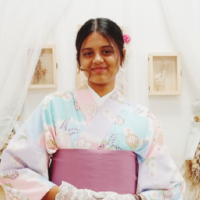
AMIRTHA VARSINI M.
Lady Doak College, India
I consider service-learning programme as one of the life turning opportunity. I made a lot of new friends and new learning. A lot of learning that resulted in a good change on me and will be transferred to my society and friends. Service-learning programme taught me that it is important to be authentic, real and raw. Being an psychology student I had a chance to improve my socializing, communicating and listening skill during this programme. A special thanks to student volunteers, professors of ICU and the community people for helping us during the programme.
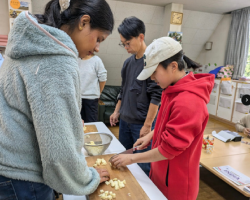
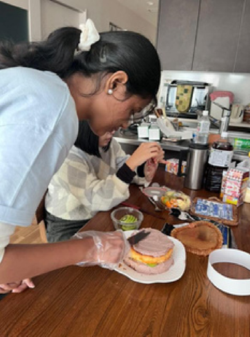
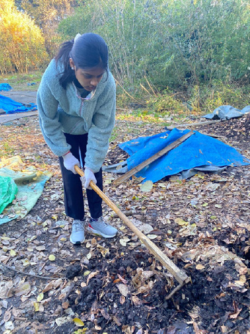
|
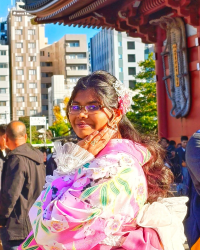
RENITA PRINCY R.
Lady Doak College, India
Hello! I'm Renita, and it's my pleasure being a part of this Japan Service-Learning programme. The composting activities taught me valuable lessons in sustainability, environmental responsibility, and community engagement. Composting activities provide hands-on learning experiences. The Emergency drills were also a lot more useful for myself as now I have learnt how to use a fire extinguisher and how fire service works. The best part of all were the home visits. The people over there were very welcoming and caring. They just took care of me like their own family members and I really felt at home there.
As an English major student, I really felt ecstatic about the English classes that took place at all schools and the importance that is given to develop the English skills of the students. The students were very welcoming and engaged in conversing with us. Some students were even more shy or hesitant to speak English but they spoke out, breaking all their shyness, and that was more impressive.
From the first day in Japan till present, I've really experienced being independent in everything, which was not possible in India. Parents would play a big part in interfering with the independence of the kids even till their adulthood, but now I've learned to be independent.
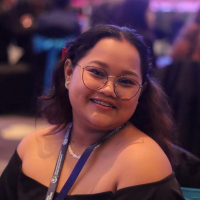
HEINI BORROMEO
Silliman University, Philippines
The Japan Service-Learning Program was a fruitful experience with a blend of cultural immersion, environmental stewardship, and community engagement. Each activity provided unique insights and experiences that strengthened my understanding and sense of purpose in culture and the environment.
Our journey began by participating in school activities with the campus's ICU Compost and orchard planting, witnessing the transformation of waste into a valuable resource instilled a deeper appreciation for sustainability. Engaging with students in Koka Gakuen, Higashi, and Free School Cosmo allowed us to support the English language while gaining knowledge of Japanese culture from the student's perspective. Participating in an emergency drill as a social work student was both educational and humbling. Observing the coordination and community involvement during this event emphasized the importance of preparedness and collective action in disaster management.
These have not only enriched my knowledge but also nurtured a deeper appreciation for cultural diversity, environmental advocacy, and community resilience. Each moment was a step toward personal growth and the importance of global interconnectedness. These lessons remind me that small, intentional actions can create meaningful change, and I am committed to turning these experiences into impactful initiatives for the betterment of my community and country.
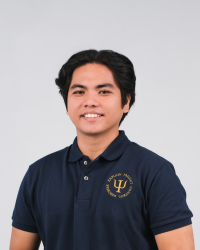
URSEEVI, JR. TUBIO
Silliman University, Philippines
Our Japan Service Learning experience last December 2024 was nothing short of wondrous. The two weeks of conducting service activities for the community members around the International Christian Community were a learning opportunity for us to become aware of the intricacies of Japanese culture and the issues they face. There were also certain activities that we were a part of during the program that we thought of emulating in our own communities as well.
Most of the community members we interacted with were from the education sector, the students, instructors, and active community members who welcome people from other countries. We were able to help with service activities in public and private institutions, and also an organization that catered to students who prefer non-formal education. It was delightful to observe first-hand the kind of education that Japan offers to children and adolescents. Its reputation for having one of the best education systems in the world is just deserving. However, there still might be room for improvement, especially in their English language education, as we met university students who expressed their concern about how they might need more focus in practicing how to speak the globally considered universal language.
I would like to mention two highlight activities that I had during the program. First, in the activities we had with the organizations within ICU, we were able to help out and learn from ICU Compost, and a team that worked on creating an orchard out of an area within campus that used to be a dormitory. The existence of those organizations shows the university’s commitment to environmental sustainability, and it made me reflect upon Silliman University as well. We have a shared commitment to promoting environmental sustainability and protecting our natural resources. I hope that the partnership between SU and ICU can also explore future collaborations on initiatives to protect the environment.
My second highlight activity was the house visitation that we had in a nearby community. The opportunity to be able to interact with a Japanese family and build connections with them was something that I valued the most during the program. Our interactions were just so wholesome, and I was able to reflect upon my own life and my family as I observed them. It was indeed a family that adapted to modern times, and that is a perspective from a family in a well-developed nation. However, even if they were living in modernity, they still preserved their traditions and everything else that was associated with Japanese culture. With that, I certainly hope that Filipino families still preserve the rich Filipino heritage and culture amidst modernity as well.
During the program, Heini and I also had the opportunity to rekindle our connections with the International Christian University students that we met last July 2023. Some of them also volunteered to guide us throughout the whole program. It was somewhat of a full-circle moment for us as we were also volunteers who guided them during their time as service learners at Silliman University.
Voices of ICU Students joined as Volunteers
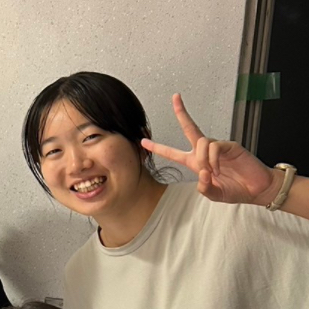
RIN KASAI
Joined service activity at Yamanashi Prefecture Fuji Research Institute
I participated in Community Service-Learning (CSL) last summer, and I was able to learn and experience many things that I would not have been able to do without SL, especially about nature and how to convey information about nature. It was also a valuable time for me to think about my future and be blessed with encounters and connections with people. I have decided to participate in International SL this summer as I want to develop further the things I learned through CSL. I decided to participate in Japan Service-Learning (JSL) as a volunteer this time, hoping to help other students have the same kind of SL experience that I had.
One of the activities I participated in JSL was ICU compost. We conducted the composting of food waste, which we usually do as a club activity. There were also discoveries, such as learning that composting is surprisingly common in the students' home countries, and we had a lot of fun doing the activity.
Through the activity, I often realized my poor English and lack of knowledge. Still, it was a good volunteer activity where I could gain experiences and learn things unique to SL, being exposed to ways of thinking and feeling I had never had before.
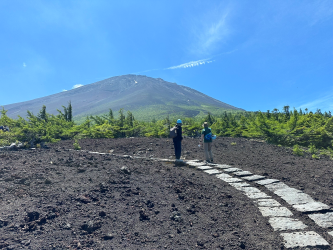
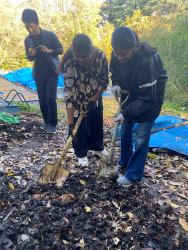
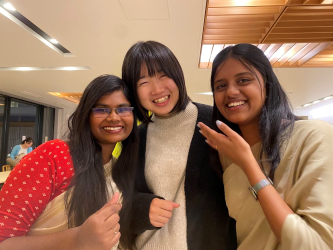
|
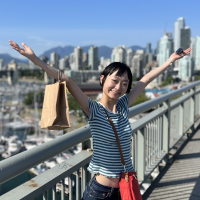
HINAKO HATA
Joined service activity at Silliman University, Philippines
Unlike studying abroad or traveling, I thought Service-Learning (SL) would give me the rare opportunity to live and do services in a developing country, so I decided to participate. I chose the Philippines because I was attracted by the learning opportunities at the three different activity sites and the buddy system with students from Silliman University.
I lived with the local people all month and gained valuable learning through activities with children from diverse backgrounds. In particular, my late-night discussions with my buddy about cultural and value differences were significant. This month was the most fulfilling period of my life.
Six months later, I had the opportunity to support the SL activities of four students from India and the Philippines, including a Filipino student who had looked after me as a buddy then. I had a new insight in the process of conveying Japanese culture and became aware of the importance of my responsibilities as a buddy at the same time.
Although these experiences are not directly related to my major, they were an excellent opportunity to change my values. I am working as an SL Ambassador to encourage more students to participate in service-learning programs. I don't know how my SL experiences will benefit my life in the future, but I will try to give back to society the things I have learned. Regardless of your major, I strongly recommend you take on this valuable experience!
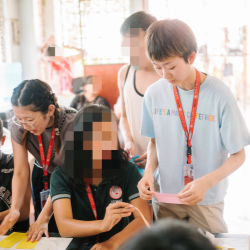 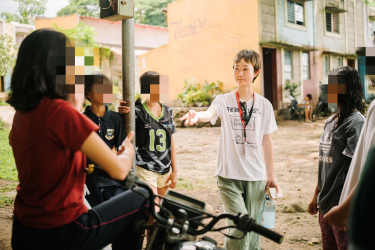
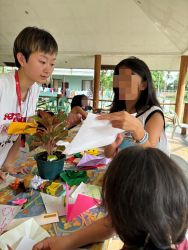
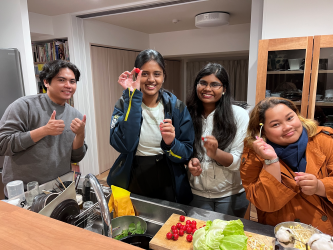
|
Voices of Partner Organizations
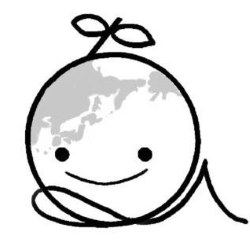
Ms. KAORI NAKAGAWA
Chi-Q-Jin
Chi-Q-Jin is a volunteer organization that conducts international exchange activities in Koganei City, Tokyo.
We accepted four Service-Learning students from ICU this year. They joined international exchange and after-school classes at an elementary school, a local evacuation drill event, home visits, and other activities.
They introduced themselves during the international exchange class, and then the elementary school students gave presentations about Japanese culture in groups. They also experienced Japanese school life by eating lunch together and cleaning the classroom while communicating.
In the after-school class, they introduced their own countries' New Year's celebrations with photos, made group quizzes based on their stories, and then had a quiz competition.
Everyone was inquisitive about how New Year is celebrated in different countries, and the elementary school students' eyes sparkled as they heard words and learned about cultures they had never heard of before. They also enjoyed activities together, such as the traditional Japanese New Year's game “Fukuwarai.”
At the evacuation drill event, they had a chance to look inside a fire engine, spray water with a fire extinguisher, and use an AED. They seemed very impressed, saying that there are no activities like this in their home countries.
After the event, they enjoyed their stay at a “Japanese home” during home visits, including cooking and eating lunch together.
These rich experiences were valuable for the SL students, the children, and us.
There are many countries, languages, and cultures in the world, and the people who live there are all “Chi-Q-Jin” (earthlings). I hope that more people will get to know each other and that we can live in a society where we can respect each other.
written by Ms. Kaori Nakagawa, Member of Chi-Q-Jin
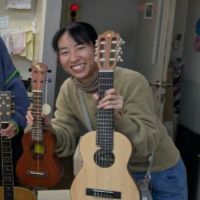
Ms. MEGUMI NOZAWA
Free Space Cosmo
First, as an ICU graduate and a former participant in the JSSL (Japan Summer Service-Learning) program, I was delighted to be involved in the JSL program as a position that accepts students.
At Free Space Cosmo, the JSL participants interacted with elementary and junior high school students through cooking. At Cosmo High School, they interacted through cooking and having conversations about social issues. While cooking, the Cosmo members asked, “What are we going to do next?” and told them "How to mix natto”. It was impressive to find the members actively trying to communicate with the international students using Japanese, English, and gestures. The international students also made a strong impression on the members as they tried their best to understand everyone and were very friendly.
Encountering others from different cultural backgrounds can bring various learning experiences, and this is also true for children and young people who are school refusals in the Japanese school system. The members, JSL participants and the staff have learned the same thing: what is normal for us is not normal for others, and we are all human beings even if we were born and raised in different places.
I think both free schools as a citizens' movement and service-learning pursue common inquiries such as “what learning is” and “what living is”. I continuously look forward to everyone gaining new learning from encounters with people and the world, making the most of the local network.
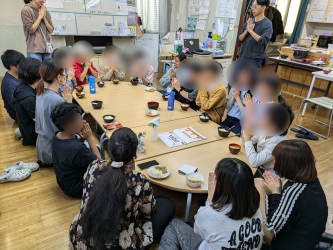 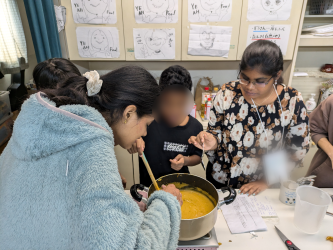 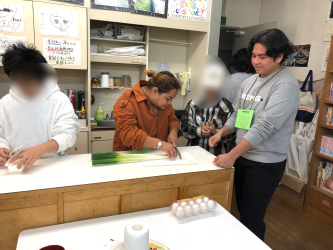 |
Coordinators of JSL Program
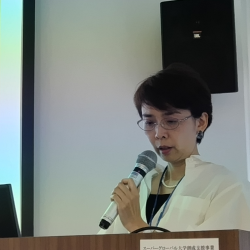
YOKO YAMADA
Coordinator of Community Service-Learning
From December 3rd to 18th, we conducted the Japan Service-Learning Program (JSL). Two students each from Lady Doak College in India and Silliman University in the Philippines participated, engaging in service activities in local educational settings and environmental projects based on the ICU campus. In the educational activities, they supported English classes at elementary schools and participated in international exchanges at a free school. They also collaborated with the local organization "Chi-Q-Jin" to support events and experienced home visits. In the environmental projects, they participated in orchard sapling planting and compost activities organized by student groups, gaining valuable experiences.
In recent times, opportunities to connect with people online have increased due to the COVID-19 pandemic. However, seeing children joyfully interacting beyond language barriers and international students speaking of how the warmth of the local people who welcomed them like family became their most cherished memory, as well as observing ICU students supporting and bonding with the international students amidst their busy schedules, I was reminded of the significance of real, face-to-face interactions.
We would like to extend our heartfelt thanks to everyone who supported and contributed to this program. Thank you very much.
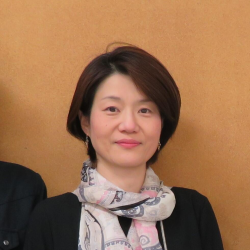
ATSUKO KURONUMA
Assistant Professor by Special Appointment
Education, Assistant Director of Service-Learning Center
This winter’s JSL program was held as a successor to the Japan Summer Service-Learning (JSSL) program, which started in 2016. After five years, I had the opportunity to take part again, and I am grateful to have collaborated with the local community through this program.
This time, I supported students from India and the Philippines in their learning, primarily through orientation and reflection sessions. Watching them embrace each experience with fresh eyes reminded me that our daily lives are rich in cultural and social assets.
Different cultures serve as mirrors, prompting us to reflect on ourselves and reconsider the nature of our own society. Service-learning values meaningful engagement, where people connect, learn from each other and foster personal and social change.
I hope that all participants were able to experience growth that inspires transformation within themselves and their communities. The JSL program will return next winter, and I look forward to continuing to create opportunities for collaboration through courses and programs. Thank you for your continued support.
Reflecting ICU by the Graduating Students
Many ICU students will leave campus for graduation in March 2025. Here are some students who served as Service-Learning (SL) Ambassadors. They participated in activities to promote Service-Learning to many high school students and current students.
SL Ambassadors: Students who have experienced 30-day service activities at domestic or overseas, and participated in activities to promote service-learning inside and outside the university.
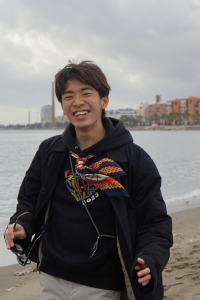
HARUKA INADA
Joined service activity at University of Cape Town, South Africa
and Dari K, Tokyo
I participated in Service-Learning (SL) in the summer of my second year and in the spring of my third year of university.
The first SL activity site is the Republic of South Africa. At a local school, I implemented Education for Sustainable Development (ESD), an education to achieve the SDGs. During my activities, it was impressive that the enthusiasm of the children attending school for new knowledge and learning was not dependent on their family's economic situation. I learned from local activists and educators about the difficulties and ingenuity in delivering SDG education to children in slums.
The second SL activity was conducted in Japan at the company “Dari K,” which is developing a social business in collaboration with Indonesian cacao farmers. Many cacao farmers only receive 3% of the profits from chocolate and are forced to live tough lives without education or hospitals. Dari K directly contracts with the farmers, buying high-quality cacao beans at a price that significantly exceeds the market price and carries out everything from chocolate production to in-house sales. Through this system, Dari K aims to improve the lives of cacao farmers as a sustainable business model rather than as a business that relies on the volunteer spirit of consumers, as is the case with fair trade. I worked with the company's sales department on sales strategies and proposals for developing new products.
I learned from these experiences that poverty and inequality worsen access to all public goods, including educational opportunities. If a social business can be realized as a solution to poverty, as Dari K aims to do, it will be possible to build a sustainable relationship of mutual support rather than a one-sided relationship of dependence, such as that between the “developing side” and the “developed side.”
With this thought in mind, I researched frameworks for my undergraduate thesis that could improve access to public goods such as water, electricity, and education. In my master's thesis, I explored ways to achieve true sustainable development by researching the roles that businesses and residents play in accessing public goods. After graduating, I have chosen to work for a risk consulting company mainly targeting public institutions. I plan to explore mechanisms to improve access to public goods from both business and public institution perspectives.
Initially, I joined the Service-Learning program because I wanted to change my values and visit Africa, but it has broadened my future options and even given me some hints about what I want to do. I hope ICU's Service-Learning program will continue to exist as an opportunity to discover things you want to do.
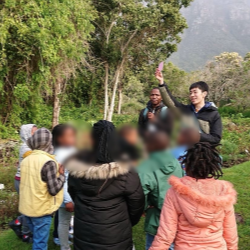
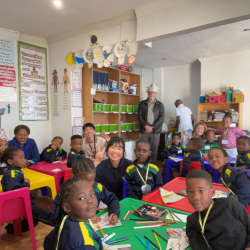
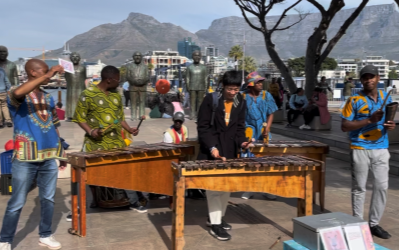
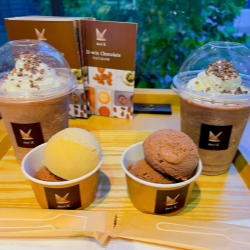
|
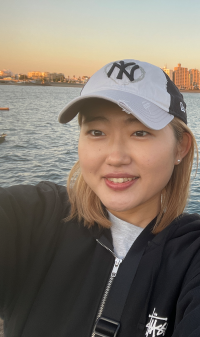
MIKU NAKAMURA
Joined activity at Lady Doak College, India
Time flies so fast. I’ll be graduating in March! I was asked to write for the Service-Learning (SL) newsletter once again, so I would like to reflect on my experiences and write a little about the good things about participating in the SL in India.
First, my interest in education deepened through my learning and experiences in the program. I had been interested in the field of education and taking a teaching course before applying. The program allowed me to teach at an elementary school in India, which was attractive and the deciding factor for me to apply. I was still in my second year when I took part in SL, so that was the first time I taught in front of real students, and that was in India. As we were going to teach Indian students, we first had to learn about social issues in India, local schools and teachers, and the classroom atmosphere. It took a long time to make and improve the teaching materials over and over, but I learned a lot from the preparation to the implementation in the class. In particular, I felt that dialogue was important in the process of creating the lessons. One of the essential concepts of the SL activities is needs analysis, so we visited the elementary school where we were going to give the lessons. On the first day, we talked to the teachers and students to find out what they were interested in and thought carefully about what kind of themes and content would motivate the students the most and what points we wanted the students to be aware of based on the needs analysis, before creating the lessons. Active communication with the students in class also helped bring us closer together. I thought that trying to make the lessons interactive was an important approach to deepening the content of the lessons.
Another good thing about the SL program in India was meeting new people. The SL participants in the same program, the elementary school students I gave lessons to, the teachers in India, and the students at Lady Doak College are all precious to me. There are many difficulties throughout university life, including assignments, exams, job hunting, and finding a career path. However, my experiences and the friends I made in India gave me the courage to overcome various difficulties. I received messages from the students and their families of the Indian elementary school during the New Year holiday season. I felt delighted to receive their kindness and that they still cared about me.
Starting in April, I will go to ICU graduate school. The experiences and memories I have from SL will encourage me in the future. For those students who will be participating and considering participation, please cherish what you learn, and your future encounters through the SL program!
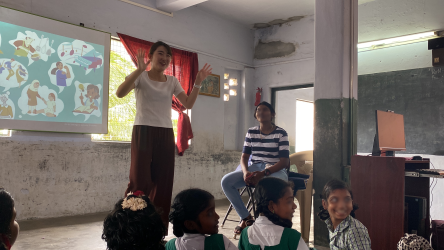 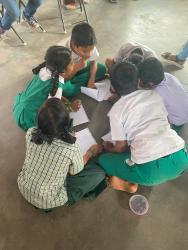
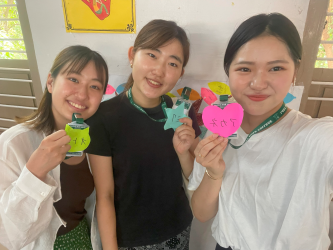
|
Message from the Director of SLC
ETSUKO KATO
Professor, Cultural Anthropology
Director, Service-Learning Center
Four students from the Philippines and India, who had never experienced winter, came to ICU at the beginning of December and participated in various community service activities. They were all a little bewildered but excited by the cold, changing leaves, food, and so on. The biggest challenge of Service-Learning was to adapt to their unfamiliar environment in a short period of time and to work for the local community with a smile, whether it was hot, cold, or they had stomach ache. Still, the four students taught us that it was essential to have the ability to be impressed by the unfamiliar and the ability to express that impression. The local kids will never forget the older brothers and sisters who came from far away to teach them about the broader world during the winter, a time of year when there are few events. Also, thank you to all the ICU students who volunteered to help out. Preparations for the following summer SL have already begun. I hope the chain of SL participants returning the favor of someone looking after them in a foreign land to someone else in their own home will continue.
Editor's note
![]()
For me, community is a place where connections create a sense of belonging. Having moved around a lot as a child, I often felt unsettled. Yet, a phrase I learned through Radio English in high school, "Home is where the heart is," continues to resonate with me and shape my understanding of community.
![]() Maybe people tend to lean towards a defensive posture without realizing it. JSL learners from abroad have brought a very good spirit to ICU and the Mitaka community. I hope to connect with an open-minded community and contribute to create such a community myself, but it's not easy. I feel grateful for the insights we can gained through interacting with people from other cultures.
Maybe people tend to lean towards a defensive posture without realizing it. JSL learners from abroad have brought a very good spirit to ICU and the Mitaka community. I hope to connect with an open-minded community and contribute to create such a community myself, but it's not easy. I feel grateful for the insights we can gained through interacting with people from other cultures.
![]() So far, my community seems to have changed with my life stage. I think it's about time to start looking for a community where I can feel social connections, a sense of security, and excitement, even as I get older."
So far, my community seems to have changed with my life stage. I think it's about time to start looking for a community where I can feel social connections, a sense of security, and excitement, even as I get older."
![]() Because I have moved my residence so often, the place I live tends to be a community. My relationships with my neighbors have been sparse, limited to bailing and exchanging greetings. With the exception of a few friends, I have spent my life without opportunities to engage with people or gatherings beyond neighborly relations.That is how I currently relate to my community.
Because I have moved my residence so often, the place I live tends to be a community. My relationships with my neighbors have been sparse, limited to bailing and exchanging greetings. With the exception of a few friends, I have spent my life without opportunities to engage with people or gatherings beyond neighborly relations.That is how I currently relate to my community.
![]() Community, for me, is a place where I feel a sense of attachment. It brings to mind the town where I grew up or where I lived as a student. It's been a long time since I left either town, but recently, I've been thinking that I want to connect with them in some way.
Community, for me, is a place where I feel a sense of attachment. It brings to mind the town where I grew up or where I lived as a student. It's been a long time since I left either town, but recently, I've been thinking that I want to connect with them in some way.

